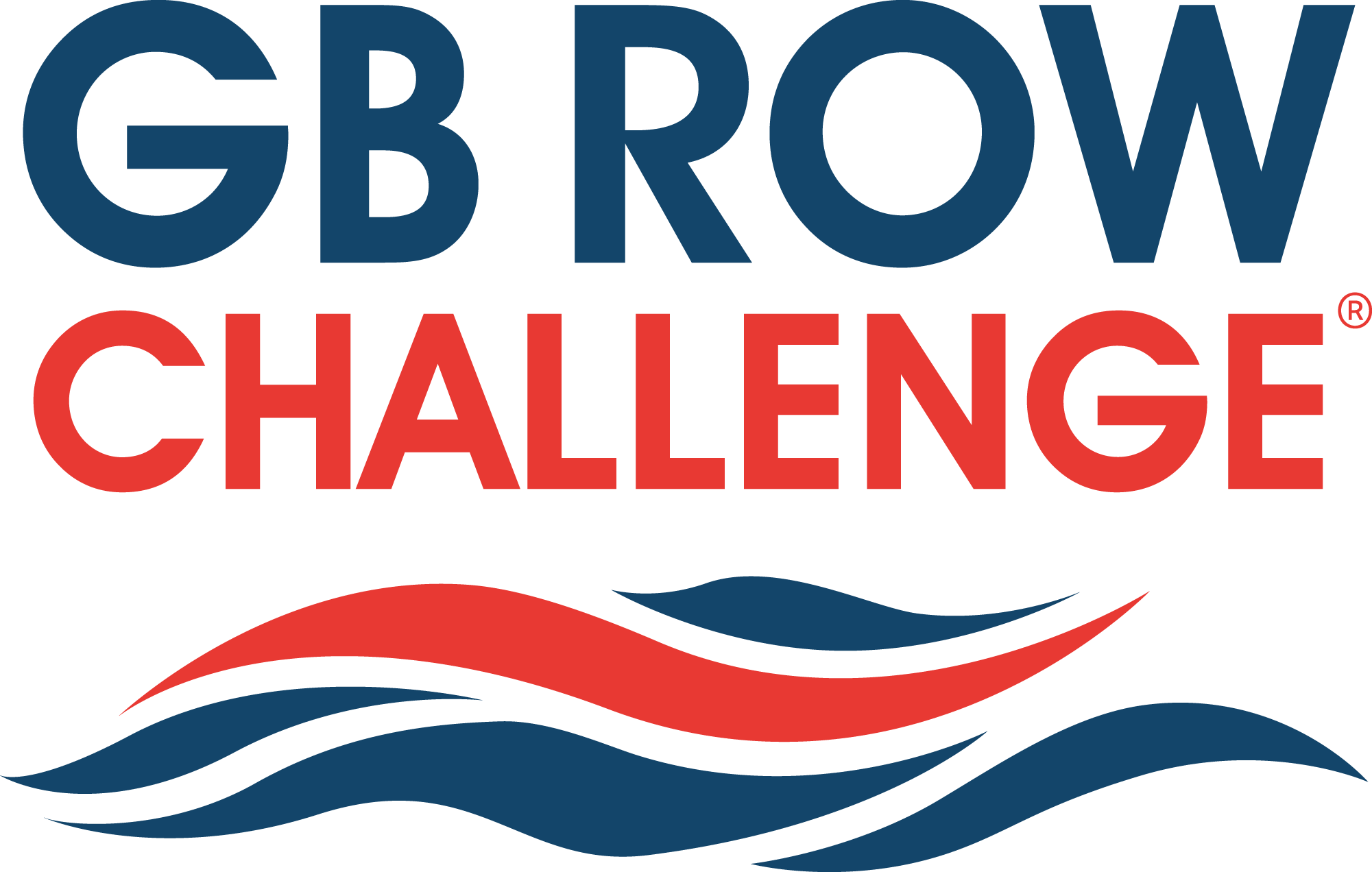About All Systems Row
All Systems Row are a six woman team setting themselves a 35 day target for the race, raising money for Renewable World.
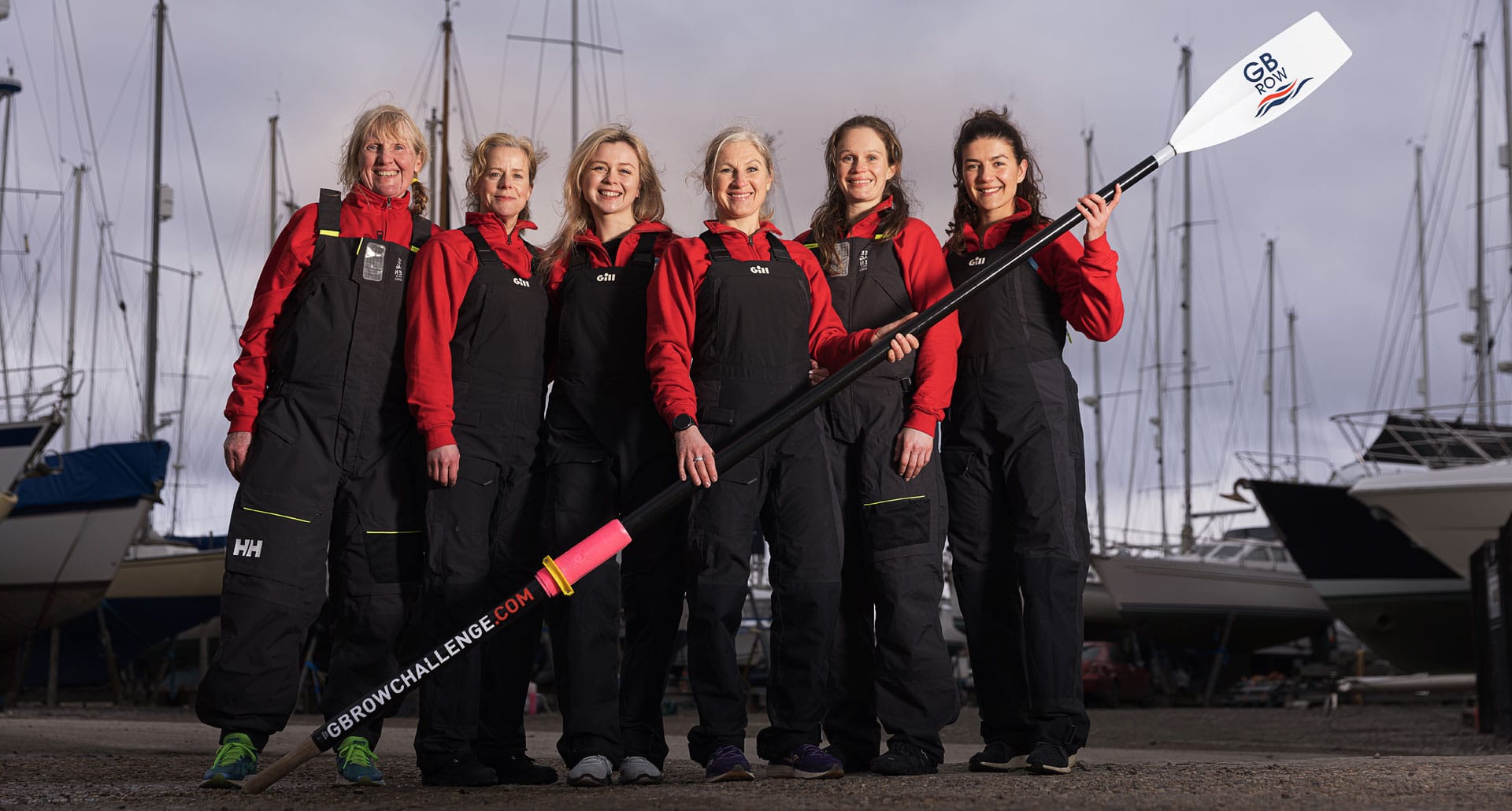
Meet The Team
Click the names below to learn more about each team member.
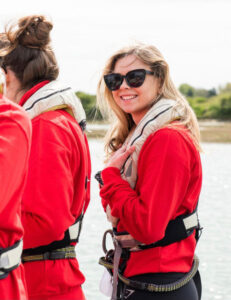
Age: 21
From: Portsmouth
Years Rowing: 8
Club: Bexhill Rowing Club
1)Why GB Row Challenge?
For the adventure! I’m also super competitive so the idea of a World Record was a fairly big driver as well as being able to see the coastline from a completely new perspective and really test my mental and physical limits.
2) What was your best and worst experience of the Challenge?
Most frustrating was passing the wind farm just off Shoreham whilst against the tide. The slowest thing imaginable! I’d do my two hour shift and still be next to the same windmill. Rest for two hours then come back on shift, same bloody windmill!
Happiest was passing Land’s End. We’d had a really long, slow day of rowing and to have finally got there was brilliant. My parents were standing at Land Ends on the phone to me and my mum just said, ‘I’m so proud, so, so proud darling’. Made me really quite tearful!
3) What experience or qualifications did you have before undertaking GB Row Challenge?
I have a background of 8/9 years as a rower so that bit was simple, but I didn’t have any of the required qualifications.
There was lots of prep involved, including:
- RYA Competent crew
- RYA First aid at sea
- RYA Sea survival
- RYA VHF
- Multiple weekends on the boat
- Five day row
- Monthly team building meetings with Julian Roberts
- Lots and lots of ergs
- Weight training
- Weekly zoom meetings as a crew (which would last hours!)
4) The collectionof scientific data is an instrumental part of GB Row Challenge, did you find this a hinderance or was it motivating.
Knowing we had this responsibility really added another element of importance to the race. However, it did make things harder as it took up time from our rest and the micro plastic filters are really fiddlyto handle with tweezers so in high winds it could be a bit of a tricky. I’m so excited to see the results though! As well as how they may change over future years.
5) How hard is GB Row Challenge? Is it really the World’s Toughest Rowing Challenge.
Yes! Not completing it is testament to that I’d say.
There are so many more variables involved in rowing around GB compared to an open Ocean row. You’ve got to think about tides, different wind directions, shipping lanes, not hitting land! If the weather was to drastically change for the worst in an ocean you have much more sea space to put out your para anchor and sit it out for as long as necessary. Around GB you can’t always do this due to the risk of drifting into any of the mentioned hazards. You’ve got to have a bit moreforward thinking and a plan A, B and C, at least, in case the weather changes.
6) What surprised you? What is the most important thing you have learned?
How difficult basic activities can be. Even just getting changed can be difficult in the tight space which can be made even harder when the waves pick up and you’re rolling all over the place.
Also, small things can infinitely improve your mood. When someone was feeling a little low on the boat we’d always ask what’s one thing that could improve how you feel by a couple of %. It was usually something simple such as a chocolate bar or glucose tab or rehydration drink which is so easy to provide but helps a great deal.
7) What would you do differently if you were to do it again
More boat time. The longest we spent continuously rowing in training was three days, I think. Spending more time in the boat means you don’t have as much of a settling in period when the race has started as you already know the routines.
8) What advice would you give to future crews?
Talk to people that have done it before. See what worked for others and whether it works for you in terms of food/clothing/general kit. Also ask them for their experiences on the boat. An example of a tricky situation and how they handled it and if they’d have done anything differently.
Look after yourself before anyone else. If you don’t eat/drink/sleep enough on your off shifts, you will be useless on that boat after a few days and the team will suffer.
9) What are you missing most now back?
- A) Being able to eat every two hours! Genuinely, I’m missing the simple life where all you have to think about is rowing, taking in the beautiful coastline, the stars at night and all the friendly people that paddle/swim/sail over to come and have a chat and find out more about us.
- B) A full nights sleep! I love sleep, anyone on that boat would agree I could sleep all day if I was allowed 😂So the sleep deprivation was not easy for me.
Also, basic things like bread and fruit. Dehydrated meals are not the same as toast and butter or a nice crisp apple!
10) What insights or learnings have you gained from the row that you will take back to your normal life?
I found I’m good under pressure and able to take control in unfavourable situations. Considering I work for the N.H.S. I’d say that’s very handy!
But also, our failure to complete the challenge taught me that sometimes things don’t go your way, and that’s okay. It’s not the end of the world and there’s always another opportunity to give it another go. Nothing is ever guaranteed.
11) Would you recommend others to give Gb Row Challenge a go and why?
I would! It’s a challenge with an extra level to the more well-knownocean rows. If you’ve done the Atlantic/Pacific/Indian this is definitely for you.
One quote to inspire others.
‘You either win or you learn, you never lose’
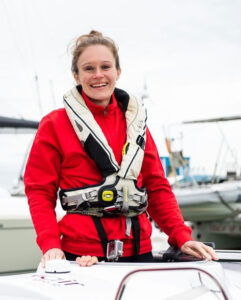
Age: 33
From: Tunbridge Wells
Years Rowing: 10
Club: Bexhill Rowing Club
1) Why GB Row Challenge?
There are quite a few reasons actually. Firstly, one of the guys from my local rowing club (Bexhill) brought his ocean rowing boat to Bexhill, about 8 years ago, prior to setting off to row the Atlantic. He later went on to row the Indian Ocean too. After seeing his boat that day I knew I’d one day like to try an ocean row myself. Coupled with this I have a great sense of adventure and love of the outdoors and what better way to experience both than rowing around GB! It was also an opportunity to learn new skills, skipper a boat and to test my mind and body to its limit.
2) What was your best and worst experience of the Challenge?
There were so many great moments it’s hard to choose! Some of the highlights include; the wildlife – dolphins, seals, jellyfish and all the birds, seeing the coast line from a different angle, the colours of the sunsets and sunrises, having only to think about rowing and not having to worry about the daily routine of life on land, the peace and quiet of the ocean, chatting to friendly skippers on other boats as you pass by, swimming in the crystal clear waters at Lulworth Cove, flying across Lyme bay in 19 hours and all the fun times and laughs with the team. Probably my most memorable moment was rowing on the 9-11pm shift, on glassy sea, watching the blood red sun set off our bow and then staring up at the sky littered with stars with the odd shooting star. There were not many places in the world that were as tranquil and peaceful as the Celtic Sea that night.
There weren’t many bad experiences but if I had to choose it would be breakfast! There wasn’t one day I could stomach a full breakfast ration pack due to the sweetness of the muesli so I often settled for something from the snack bag. I also found it quite difficult to judge distance in the dark. It can be quite disorientating with lights from other boats and from the land so judging distance could be a challenge. Luckily there are lots of navigational aids out there to help.
Of course, the hardest experience was rowing while the storm, which ultimately resulted in our rescue, got worse and the winds became stronger and waves ever higher. My ultimate concern as the weather worsened was for the safety of the crew and with the ever growing realisation that we were not going to make our intended anchorage with worse weather conditions to come, and drifting towards a TSS, the only decision remaining was to call for the RNLI rescue. Not a decision taken lightly but absolutely the right decision.
One of the most frustrating times came after we rounded Land’s End. It was the summer solstice and a beautiful sunset as we passed around Land’s End but as we turned to head north, we were met by a stronger northly wind than we had expected. By this point we’d been rowing continuously for 3 days and were beginning to feel somewhat fatigued. We rowed through the night, but our speed slowed considerably until we were unable to make any forward progress. The wind, coupled with a change in the tide, meant we were also being taken towards a Traffic Separation Scheme. It was clear the lack of progress, fatigue, high tension levels were making this night the hardest yet, mentally, and physically. Thankfully, the sun did come up and so did our speed and spirits!
The happiest time was rowing towards Land’s End, in the warm sunshine and Lia had handed us out a surprise from Odd Balls, one of our sponsors. We all put our new funky sports bras and pants on, donned our colourful summer hats and sang and danced while we rowed!
3) What experience or qualifications did you have before undertaking GB Row Challenge?
I have been coastal rowing for 10 years and had a small amount of dinghy sailing experience but I’d never done anything like this before. All the qualifications needed for GB Row I’ve learnt over the 18 months leading up to the race.
4) The collection of scientific data is an instrumental part of GB Row Challenge, did you find this a hinderance or was it motivating.
Without doubt a motivation. It didn’t take too much to work it into our daily routine. Lia was mainly responsible for collecting the samples for the eDNA and Steph for the microplastics, but we all chipped in at times. To be part of the ground breaking research, and not only that but to be able to collect the first round of samples, was a real privilege. As we all know, climate change is affecting all of us and our oceans. Helping to mitigate these effects is something our crew all held close to our hearts and so being able to collect samples certainly spurred us on.
5) How hard is GB Row Challenge? Is it really the World’s Toughest Rowing Challenge.
I’ve never taken part in any other ocean rowing events but regardless, this goes down in my book as the hardest one. With little to no ocean sea experience we spent 18 months preparing for this row, nothing can fully prepare you for the race. Unfortunately, our sixth member of the team had to withdraw a month or so before the race started. We weren’t able to find a replacement to fill the spot, so we went as a five. This meant we either had two or three people on the oars and made shift patterns more difficult. Fatigue also played a big factor. Getting used to the two hours on two hours off shift pattern was quite a challenge. Some of the team were able to manage this better than others while Steph and I had the additional challenge of making sure our navigation was done during our 2 hour off periods, further reducing our sleep time.
Managing team expectations with adverse weather conditions approaching wasn’t easy either. Understanding that it’s better to wait out bad weather and take shelter early, was quite frustrating for those members of the team eager to plough on!
The early morning shifts, 3-5am and 5-7am. These were killers for us! You’d often find at least one of us on the oars would be failing miserably to keep our eyes open. We’d still be going through the motion of rowing, but our blades might not be in the water, or we’d be talking absolute rubbish, or hallucinating but we’d still be out there doing our shift!
At the end of the day, we knew this wouldn’t be an easy race, but we loved the challenge!
6) What surprised you? What is the most important thing you have learned?
What surprised me the most was just how tough this race actually is. It’s one thing doing the practice rows but doing the actual race is a totally different experience. Teamwork and communication are by far the most important aspects to get you round this race. Living on a 10 meter boat is never going to be easy but can be made so much smoother by working well together, understanding each other, having mutual respect for each other and supporting each other through the ups and downs.
7) What would you do differently if you were to do the Challenge again?
We did a lot of physical fitness prior to setting off and were all quite fit to begin with which certainly helped. We also had our psychological and leadership coach who worked with us for the 12 months leading up to the race.
If I were to do this again, I’d look more closely at rations. We went for variety and had so many different options of meals. Whilst this sounds fantastic it was hard to source food that each rower would eat. Also, taste buds change when you’re out on the water and many of us really struggled to eat the breakfasts. I’d say choose three to four basic meals that everyone will eat and just stick to those. Don’t try and make the meals fancy. You can take extra, more enjoyable treats in your snack packs.
I’d also look at the packing of the boat in more detail and make sure food packages are parcelled up more simply, I.e. breakfasts in one hatch, lunch in another and dinner in another all in bundles with the number to represent the number of crew, eg. 5 for our crew. Ensure the food is distributed equally across the hatches to prevent the boat becoming unbalanced as you eat through the food.
As a crew, we were all new to the world of being out on the open ocean. We’d completed all the necessary training and hours and had done some additional sailing during the preparation. Although we had fantastic support and help from the GB land navigation crew, I would highly recommend having someone in the crew who has more sea fairing experience, both with respect for weather and navigation. Not to say we wouldn’t have completed the race with the training we had but just that it would have been very helpful!
8) What advice would you give to future crews
Ensure the team respect each other and share a common goal. That might sound obvious but if, for example, you have one person who wants to get round safely and another who wants to get round as fast as possible you might find you have different approaches and not see eye to eye.
Passage plan and ensure you know how much/little communication and input you will have from the land team. This helps both parties.
Take enough food to allow for unexpected events that might mean you’re at sea a lot longer than anticipated.
Respect the skipper’s decision. Of course, have your input and team discussions, but at the end of the day someone must make the final decisions.
Always make your shift on time. Have a routine so you know where all your kit is and how long it takes to put everything on so you’re ready for each shift with a smile on your face. Even when you’re feeling your most tired.
We had a ‘no whinging’ rule!
Look out for your teammates. A buddy system could be helpful. Pairing up so you can have someone to check in with you, to laugh with you and recognise when you may need a bit of extra help and support.
Ultimately have fun and enjoy it! It’s not every day you get to do something like this!
9) What are you missing most now back? What did you miss most when on the water?
The things I miss the most now I’m back is the freedom of being out on the water. The simplicity of life. The feeling of being out there knowing you are raising money for worthy environmental causes as well as collecting valuable date for Portsmouth Uni. Seeing the stars, the dolphins and seals, the challenge of balancing navigation, rowing, sleeping, eating and trying to keep the boat moving, and of course the fun times we had as a team.
There wasn’t a huge amount I missed when out on the water. I suppose a shower would be the main thing and clean clothes.
10) What insights or learnings have you gained from the row that you will take back to your normal life?
I’ve learnt a lot about leadership during my time as skipper. As well as learning how to deal with failure. I’ve also learnt practical skills like how to build a website.
Fundraising and gaining sponsors proved quite challenging but try and make the most of any connections you may have.
11) Would you recommend others to give GB Row Challenge a go and why?
Yes, absolutely. Although we didn’t get all the way round, the skills we learnt and experiences we had will last a lifetime. For anyone thinking of doing an ocean row this one will certainly test you to your
limits. The British coastline is stunning and the challenge of tidal currents, fast changing weather, rip tides and navigating hazards will rival any other ocean race out there. It may not be the longest ocean race but it’s certainly the most challenging.
One quote to inspire others?
Oliver Wendell Holmes
‘’What lies behind us and what lies before us are tiny matters compared to what lies within us”.
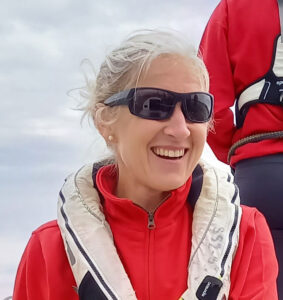
Age: 45
From: Bexhill, East Sussex
Years rowing: 0
Club: Bexhill Runners and Triathletes
1) Why GB Row Challenge?
I really wanted to be a World Record holder. I had read a book about four British mums who had rowed the Atlantic and that is what had put the idea into my head. In the end, I didn’t achieve this goal, and I feel really disappointed about that, but I did achieve many other things that I am proud of. I also wanted to be inspiring for my own kids and other children and young people. I love adventure and journeys, and this seemed like a great opportunity to take part in an expedition that few women had attempted previously and see our island from a different perspective. I wanted to escape from my hectic life for a while and do something really physically demanding and challenging.
2) What was your best and worst experience?
So many best/happy bits: being part of a brilliant team, having lots of fun, laughing a lot, being in a wild, wild storm, – so awesome, being in such deep water with no land anywhere around us, seeing all the other sea-going craft, every single sunrise and sunset, every night sky, the moon, the ripples on the water and the changing light, the changing sea states, the HUGE waves, the birds playing in the waves, the seals and dolphins, the cliffs and rock formations on the shore, riding the waves across Lyme bay – I was literally rowing with a grin on my face, the friends and family who came out to visit us, the amazing send off on Tower Bridge, the rhythm of the days and nights – the simplicity of repeating the same pattern over and over, having nothing to rush off to, being able to focus totally on where I was and what I was doing, having time to stop, think and take in my surroundings
Worst/most frustrating experience: Not being able to continue and complete the challenge. Our dream was over – it was awful.
3) What experience or qualifications did you have before undertaking GB Row Challenge?
I was not even rower before signing up to the GB Row Challenge, so the first thing I had to do was learn to row! I found a great rowing coach in my running club and very supportive people willing to help within the rowing club that I joined. I learned on a river initially, then joined a weekly league on rowing machines (which I won!) and I also joined a weekly coached training session. I also did early morning erg training at 6am twice a week with team mates on the seafront (mainly in the dark through the winter) and borrowed an erg from a friend, which I trained on at home, getting the kids to feed me grapes when I was doing long ones!
I tried to keep up my normal trail running for fitness and I did a 50 mile mountain race during the row training period that I had already entered before I entered the rowing challenge. I also did yoga and strength and conditioning regularly in the year leading up to the challenge.
I had used VHF radios when I worked in Africa, so passing my VHF marine licence wasn’t too difficult, nor was the Sea Survival course – just a weekend each. As a team, we spent 5 days on a yacht in February, which enabled me to pass my Competent Crew course. I was already a dinghy sailor with some idea of tides and wind.
Other training was a monthly psychological training/team building session with a consultant – Julian Roberts – who worked with us for a year. This was incredibly helpful. I also devoured lots of books about sailing around GB, swimming around GB, leadership, rowing…
4) The collectionof scientific data is an instrumental part of GB Row Challenge, did you find this a hinderance or was it motivating.
Well the e-DNA data collection did take quite a lot of time, especially when we were tired and wanted to go to sleep, and unfortunately an electrical fault caused our microplastics collecting machine to fail, so we weren’t able to do much of that. For some team members the environmental element was a really motivating factor, for me, I think that it is only in hindsight that I am appreciating quite how exciting it was to be part of gathering such research. At the time, my focus was on the journey and completing the challenge, especially the world record aspect of it. I have gained a lot of more knowledge and awareness about the plight of our oceans as a result of taking part in the challenge and it was particularly exciting to meet the specialist scientists doing this important work. I went from knowing nothing about it to now having some knowledge and understanding – they have piqued my interest in a subject that I was oblivious to, but which is incredibly important and topical.
5) How hard is GB Row Challenge? Is it really the World’s Toughest Rowing Challenge.
The first nine days were an absolute blast and I had the best time ever, enjoyed it immensely and could not believe our luck that we were actually rowing about Great Britain wearing bikinis!! The weather was so warm, the wind was favourable, the sea was calm. It was a lot easier than I had expected. Physically I had a few aches, but it certainly wasn’t the hardship that I was expecting. We had prepared well – we were fit and strong, we had good routines in place, we had a few comforts like sheepskins to sit on, tasty snacks. Unexpected visits from friends and family were a huge highlight. The team got on well and we were having fun. There were some hard times during the early morning shifts when we felt really tired and just wanted to sleep, but we got through them.
Then we were stuck on anchor in a cove for 48 hours waiting for adverse weather to pass and I found this incredibly difficult – to be taking part in a race but going nowhere – it was immensely frustrating. I could not wait to get going again.
When we found ourselves in the big waves of the Irish Sea, rising and falling on the peaks and troughs, being thrown around as waves came from all angles, blind-sided us, drenched us, cold, hard rain hitting our faces – that is more like what I thought it was going to be like. We had to have our wits about us, it was more of a battle with the elements, invigorating, exhilarating – I loved it. Physically it was tough, exhausting, I was dehydrated, but I felt so alive and awestruck. I appreciate that we were taken to land for our safety and if we hadn’t then we were at serious risk, but that was a very hard time, knowing that our journey would not be continuous or unassisted. At that stage, we did not know that it was all over for us.
That news was definitely the hardest part of it all. We were devastated, deflated, disappointed.
I wasn’t involved in the navigation and I found it difficult that I wasn’t part of that decision making and didn’t have a full understanding of why we were making the choices that we did. I wanted to know more about our plans and be part of that strategizing process because I wanted to make as much progress as possible. We were closely monitoring the boat in front of us and really wanted to catch up.
We always knew that it was going to be physically and mentally hard and we were prepared for that. We knew that we would encounter severe weather, but we hadn’t really allowed ourselves to think that we would not complete the challenge. That was the hardest thing for me – not to accomplish what I set out to do. I don’t think this is a challenge for novices – you need to know what you’re doing really if you’re going to succeed.
I don’t know if it is the hardest rowing event out there – I haven’t looked at any others really. This is the one that I wanted to do – close to home and to see our own island.
6) What surprised you? What is the most important thing you have learned during the Challenge
I was surprised how much I enjoyed it. I thought it was going to be a lot more suffering, but I absolutely loved it.
I learned that failure is OK and it shouldn’t put you off from having a go at difficult things in the future.
7) What would you do differently if you were to do the Challenge again?
I think we trained well and packed well. We were well organised. I would have done even more drills – using the drogue and para-anchor, man overboard etc. We were strict with what clothing we took with us. We will never know whether we would have got through all the rations that we took with us if we had managed to row all the way around GB, but we certainly had a lot! And it turned out that lots of the meals we couldn’t actually stand the taste of and didn’t want to eat! It is hard to know before you go what you are going to fancy eating, but definitely worth trying them out during training.
If I was to do it again, I would definitely complete all the navigation courses myself so that I could make decisions about our route choices and timing.
8) What advice would you give to future crews?
Spend lots of time together and learn what makes each other tick.
Take lots of yummy food with you.
Be kind to one another.
Be patient – you can’t control the weather and its charge
Enjoy every moment – it is such a special and precious time.
9) What are you missing most now back?
Missing now I am back home: The simplicity of the daily routine. The tranquillity, the calm, the time and space. The incredible beauty all around me. Being outdoors and physically active all day every day.
Missed on the water: cuddles from the kids and chatting with them. SPACE! Not much really.
10) What insights or learnings have you gained from the row that you will take back to your normal life?
It’s OK just to have fun (I learned that from a bird playing in the waves).
Most things that you spend time worrying about aren’t really an issue at all.
People from very diverse backgrounds and with very different personalities and skill sets can form amazingly tight, supportive bonds with one another if you take the time to learn about one another and listen to one another.
Nothing ventured, nothing gained – I was in it to win it (Guinness WorldRecord). We didn’t win it, but I’m still very glad we were in it.
11) Would you recommend others to give GB Row Challenge a go and why?
It’s not a challenge you can just ‘give a go’. You need to put a huge amount of planning into it. More than you could ever anticipate at the start of the process. We devoted our lives to it for 15 months. We were totally obsessed by it and absorbed in it. It is not something to take on lightly, but if you are willing to take it on wholeheartedly then you will be well prepared and enjoy it.
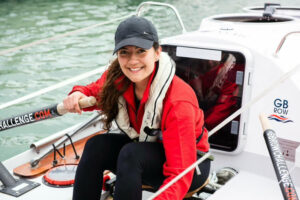
Age: 22
From: Bexhill
Club: Bexhill Rowing Club
1) Why GB Row Challenge?
Due to the pandemic, I had pushed back signing up for the army to help in the NHS. Working during the pandemic pushed me as a person. I learned to thrive working within a team and under pressure. When the opportunity arose to undertake an ultimate physical and mental team challenge, it was the perfect next chapter in challenging myself and my physiotherapy endurance training knowledge. ‘Practice what you preach!’
Moreover, I am passionate about climate research and I am a keen charity fundraiser. GB Row Challenge provided the perfect platform by which I could raise the profile of remarkable climate and conservation charities (Blue Marine Foundation and Renewable World), whilst actually partaking in ground-breaking climate research- with thanks to Nature Metrics and the University of Portsmouth!
2) What was your best and worst experience?
My best and worst situations often came hand in hand. As we ventured far from civilisation, we were in the mercy of the natural elements and I felt extremely lucky to appreciate a view of the world unspoilt by light and noise pollution. Tough times were often the most humbling, as we rowed through a hostile sea, a peaceful star-filled sky overlooked us, or hundreds of playful dolphins would effortlessly navigate the same moody waves we wrestled for hours in the Irish sea. With perspective, there is beauty and positivity in every situation.
3)What experience or qualifications did you have before undertaking GB Row Challenge?
I am a Physiotherapist in profession and had undertaken competent crew, short range VHF radio, sea survival and First Aid at Sea certifications. We trained approximately 200 hrs on the boat, with many more hours at boat-side to familiarise ourselves with packing and equipment.
4) The collectionof scientific data is an instrumental part of GB Row Challenge, did you find this a hinderance or was it motivating.
It was both. Forcing 30 syringes of saltwater through a sample disk in rough seas, required some muscles and patience… However, the curiosity for what was in the water below us, grew each day. Would there be any correlation between the two science samples? In the areas with more micro plastics, were there less species? I was glad to be doing my bit for research that I feel is extremely important.
5) How hard is GB Row Challenge? Is it really the World’s Toughest Rowing Challenge.
Due to tides and tight weather windows, we had to spend a significant amount of time at anchor, we pushed hard for up to 5 days at a time but we were anticipating a ‘non-stop’ regime. It was actually much more of a mentally frustrating challenge than physical for us. We took a preventative approach with hands and bums, which paid off. But sitting on a 10m row boat for 19hours, in a holiday cove, when we wanted desperately to be making progress, was extremely difficult!
6) What surprised you? What is the most important thing you have learned?
It surprised me how differently people responded in stress situations. I learned that these situations often arise from and equally depend on, effective communication. The foundations of security within a crew are built on trust and trust is built by constructive two-way communication. I feel it is extremely important to ensure all team members feel heard and that they harbour individual skill sets valued by the team. Difficult conversations are vital for safety and team dynamics. For example, highlighting if someone is struggling and/or harbouring counterproductive feelings, is extremely important when you’re living in such close quarters for such a long time. Good team dynamics would equip a team well for overcoming a dangerous situation, together.
7) What would you do differently if you were to do the Challenge again?
Pack less granola and more wipes! I would ensure the team agrees to a shift pattern and strict personal care regime to enable each team member to fulfil their responsibilities within the crew overtime.
8) What advice would you give to future crews?
Can the crew afford to get more members certified day skipper/ costal skipper?
Consider who may be able to step up as skipper in unforeseen circumstances.
Encourage an open and non-judgemental communication environment and prioritise wellbeing. It is important to look after yourself to be able to sustain your role/ responsibilities within the crew overtime.
Lastly, stick to order and do not cover for each-other, someone will only have to cover for you later down the line!
9) What are you missing most now back? What did you miss most when on the water?
It is weird but when you first loose the intense training structure and the eat, sleep, row repeat regime on the boat, you suddenly feel very lost! But when I was on the water, I couldn’t wait to have free will again, just to say ‘5 more minutes’!
10) What insights or learnings have you gained from the row that you will take back to your normal life?
Sweat the small things! Be it conversations you don’t know if would be ‘worth it’ or just ensuring you are prepared makes things much smoother. I will ask myself if I have sufficiently discussed my decisions within the multidisciplinary teams of the NHS and ask for feedback. It is effective communication, transparency and accountability that builds trust and rapport.
11) Would you recommend others to give GB Row Challenge a go and why?
Often the people you would want on your crew, are not always the ones with sea faring experience. I would recommend GB Row Challenge as a second row, due to the complexity of the coastline, tides and proximity of hazards.
One quote to inspire others
Bexhill Rowing Club have a quote on the wall; ‘What would you do today if you knew that you would not fail?’. I now know that when you step out of your comfort zone, you either win or you learn, you never really fail. Do it.
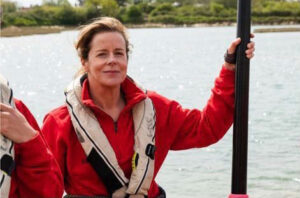
Age: 51
Years Rowing: 5
Club: Bexhill Rowing Club
I am from Massachusetts, USA where I first rowed at University on the Charles River about 34 years ago. I moved to the UK in 2000 and married a Brit, we have a 13-year-old son.
I work as a NeuroPhysio with acquired brain injury survivors. It is a job I find stimulating and rewarding.
I rediscovered rowing 4 years ago, but this time on the sea. I absolutely love it and it has given me a new lease on life- training with rowers of all ages, pushing myself beyond what I thought was possible. I am thrilled about taking on this challenge with 5 strong women and I can’t wait to take in the gorgeous British coastal landscape along the way.


